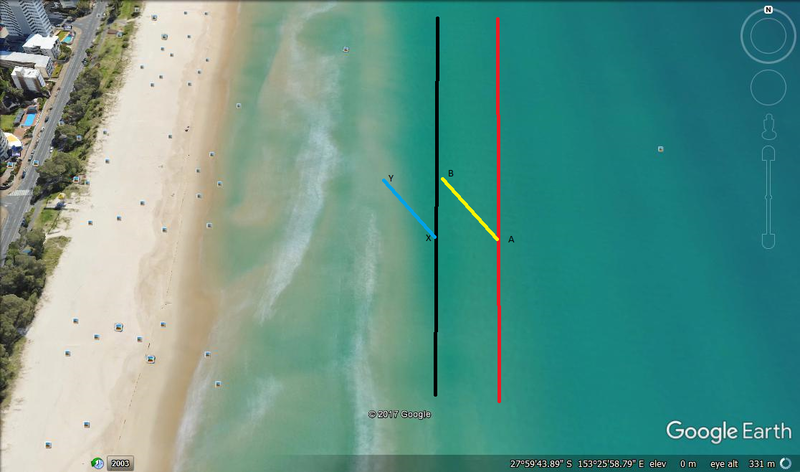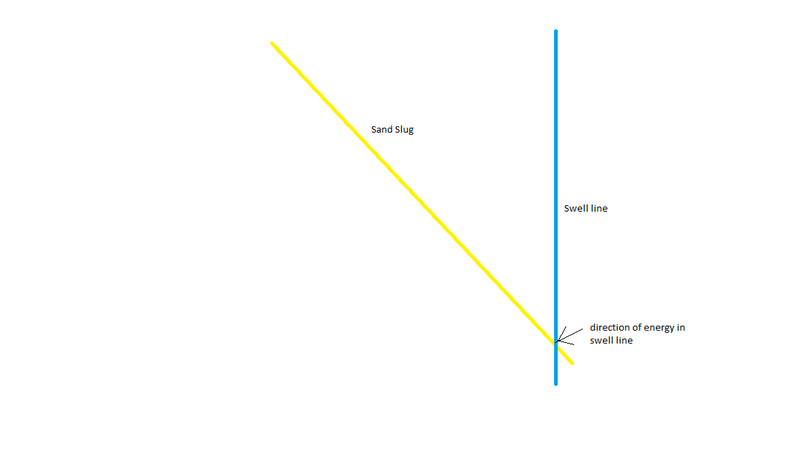Page 2 of 4
Re: Shearer. Boo. Come in here
Posted: Fri Jun 16, 2017 5:31 pm
by steve shearer
tootr wrote: ↑Fri Jun 16, 2017 3:52 pm
A tangent but there was some noise about "not enough" being done to save that beached whale at sawtell.
Apparently it's really easy to dig a channel through a shallow sandbank in 4' of short period slop.
tbh just listening I thought they delayed the rescue too long.
They should've scrambled on the first high tide before the weather turned foul.
Re: Shearer. Boo. Come in here
Posted: Fri Jun 16, 2017 7:39 pm
by The Mighty Sunbird
Don't they come in because they want to?
Re: Shearer. Boo. Come in here
Posted: Fri Jun 16, 2017 8:03 pm
by alakaboo
Geobags are better than sand but worse than rock for making a surfing reef, foamy.
They just aren't dense enough to stay where you want in the active surf zone, and they settle a lot because they rarely get installed with a proper toe (foundation) so they get undermined.
Deep in the water, with bus-sized bags like the narrowneck ones, on a hard base, they are great.
And they look much better than rock, reduce rebounds a bit, and have more marine growth on them.
Re: Shearer. Boo. Come in here
Posted: Fri Jun 16, 2017 8:23 pm
by Slobadan Madicubich
That is correct.
They are a modern day Trilobite
Re: Shearer. Boo. Come in here
Posted: Fri Jun 16, 2017 8:30 pm
by steve shearer
great band
Re: Shearer. Boo. Come in here
Posted: Sun Jun 18, 2017 6:09 pm
by carvin marvin
I would like to see the Gold Coast engineers build a permanent sand slug using sand filled geotextile bags.
A swell that has travelled over a sand slug gets transformed into a tapered swell.
A tapered swell might be say 5ft one end and 3ft the other end.
A tapered swell then breaks as a peeling wave, simply because the 5ft end will break in a depth of water further out than the 3ft end.
A sand slug is the cheapest and simplest way to create a peeling wave.
Re: Shearer. Boo. Come in here
Posted: Tue Jun 20, 2017 8:35 am
by carvin marvin
http://www.coastalwatch.com/surfing/217 ... st-beaches
It looks like the sand dredging boat can piss the sand about 120 metres.
If you look closely you can read the boats name.
"The Golden Sand Shower''.
Re: Shearer. Boo. Come in here
Posted: Tue Jun 20, 2017 8:46 am
by steve shearer
carvin marvin wrote: ↑Sun Jun 18, 2017 6:09 pm
.
A swell that has travelled over a sand slug gets transformed into a tapered swell.
Are you perfectly sure about that?
Could you explain how?
Re: Shearer. Boo. Come in here
Posted: Tue Jun 20, 2017 9:27 am
by crabmeat thompson
watching this thing spit sand up and down the coast for the last few days.
now we have grade 6 rapids moving to the north in 4-6 foot of SE swell with strong to gale S winds ... it's safe to say it's all been for nothing, huh?
Re: Shearer. Boo. Come in here
Posted: Tue Jun 20, 2017 9:59 am
by steve shearer
thats the thing with sand. It's highly mobile.
the amount of sand that has been shifted here in the last week and a bit has been incredible.
Re: Shearer. Boo. Come in here
Posted: Tue Jun 20, 2017 10:03 am
by Drailed
steve shearer wrote: ↑Tue Jun 20, 2017 9:59 am
thats the thing with sand. It's highly mobile.
the amount of sand that has been shifted here in the last week and a bit has been incredible.
No shit, granules of sand are highly mobile.

Jesus Steve.
Re: Shearer. Boo. Come in here
Posted: Tue Jun 20, 2017 11:30 am
by steve shearer
it's a little more complicated than that Loof.
Re: Shearer. Boo. Come in here
Posted: Tue Jun 20, 2017 12:41 pm
by Nick Carroll
steve shearer wrote: ↑Tue Jun 20, 2017 8:46 am
carvin marvin wrote: ↑Sun Jun 18, 2017 6:09 pm
.
A swell that has travelled over a sand slug gets transformed into a tapered swell.
Are you perfectly sure about that?
Could you explain how?
Umm fcuk isn't that what happens at pretty much every training wall in NSW? Sand slug is pushed out by the rivermouth's re-direction ... swells come across that slug and are broken up into peaks and wedges ... happy days.
Re: Shearer. Boo. Come in here
Posted: Tue Jun 20, 2017 12:54 pm
by alakaboo
steve shearer wrote: ↑Tue Jun 20, 2017 8:46 am
carvin marvin wrote: ↑Sun Jun 18, 2017 6:09 pm
.
A swell that has travelled over a sand slug gets transformed into a tapered swell.
Are you perfectly sure about that?
Could you explain how?
The effect is right but the mechanism isn't.
The shallower slug bathymetry causes refraction as it slows the part of the swells that hit it more than the adjacent part of the wave in deeper water. The waves taper/have shoulders or peaks due to the bathymetry, they aren't changed into 'tapered swells'.
If you Google tapered swell you get images of urethral dilators and penis plugs.
Carvin, I suggest you read a bit about wave refraction and wave periods.
Surfline has some good articles.
http://www.surfline.com/surf-science/bathymetry
Re: Shearer. Boo. Come in here
Posted: Tue Jun 20, 2017 2:12 pm
by steve shearer
thats the mechanism Boo, I guess what I'm asking is how effective these sand slugs are at activating it?
How effective, for instance, was the Cronulla sand slug?
There's lot of data now from the Gold Coast where sand replenishment has a long history. Everything I've seen points to sand outlets on the beach ala South Straddy and D-bah (ocassionally) producing the best surf with sand placed beyond the surf zone being ineffective at best and decreasing surf quality at worst.
There's a lot more going on at most rivermouth breakwall spots than just refraction on river bars, including phase enhancement leading to amplitude increase, wedginess from rebounding waves and increased deep water refraction on longer period swells due to canyons carved in the shelf and slope from ice age river flows. Pretty complex wave zone, that almost always leads to good surf.
Re: Shearer. Boo. Come in here
Posted: Tue Jun 20, 2017 2:52 pm
by carvin marvin
Here is my attempt at trying to explain sand slug swell tapering.
The key to understanding how a sand slug works is to visualise energy moving at an angle in the swell line.
It is easier to explain with a diagram.
This diagram shows the wave breaking zone between the shore and the black line.
It also shows the zone between the black line and the red line where the swells start to feel the bottom and slow down.
This zone is where you would build the sand slug (yellow line) at a 45 degree angle to the swell line.

The blue line represents where the right hander would peel from X to Y.
How does it work.
When a swell gets to a certain depth (red line) it starts to feel the bottom and one of the effects is that it starts to slow down.
When a swell travels over and feels the sand slug that is extending up off the seabed floor it slows down slightly more.
The energy in the line of swell beside the energy that has been slowed down by the sea slug has not slowed down yet, because of the angle of the sand slug.
This energy gets the chance to move at an angle/merge in front of the swell that has slowed down. (THIS IS THE KEY POINT, DOES THIS HAPPEN).
Meaning the physical shape of the swell is ever so slightly starting to change.
This starts the tapering effect and this effect continues as the swell travels towards shore over the angled sand slug.
The black arrow in the diagram below indicates the angled/merging energy.

A rocky groyne like Illuka with its slight dog leg effects the swell energy from the side not from underneath like a sand slug, the energy there is an example of energy inside the swell bouncing off the groyne and moving forward at angle and peaking up.
Re: Shearer. Boo. Come in here
Posted: Tue Jun 20, 2017 3:18 pm
by Nick Carroll
carvin that's just refraction mate. It's at the heart of heaps of the world's best waves. Pipe is just one glaring example. All the French beachies. Puerto Escondido, Nazare, Black's (CA). Almost everywhere in the mentawais. On and on and on. But you do have to have a shoreline that co-operates with the refraction. You can stick sand slugs offshore all you like, but if the shoreline's not up for it, the surf will still be shit.
Interesting how artificial reefs have dropped off the hype radar at just about the same time as wave pools have sprung forth upon it. Artificial reefs were the Old Monorail, wave pools are the new!
Re: Shearer. Boo. Come in here
Posted: Tue Jun 20, 2017 3:29 pm
by alakaboo
steve shearer wrote: ↑Tue Jun 20, 2017 2:12 pm
thats the mechanism Boo, I guess what I'm asking is how effective these sand slugs are at activating it?
How effective, for instance, was the Cronulla sand slug?
There's lot of data now from the Gold Coast where sand replenishment has a long history. Everything I've seen points to sand outlets on the beach ala South Straddy and D-bah (ocassionally) producing the best surf with sand placed beyond the surf zone being ineffective at best and decreasing surf quality at worst.
There's a lot more going on at most rivermouth breakwall spots than just refraction on river bars, including phase enhancement leading to amplitude increase, wedginess from rebounding waves and increased deep water refraction on longer period swells due to canyons carved in the shelf and slope from ice age river flows. Pretty complex wave zone, that almost always leads to good surf.
They didn't do any proper monitoring of the Cronulla slug, and it was an order of magnitude too small to persist.
Anecdotally it worked, but it was also in a location with natural focussing (hence the prince St seawall).
The science is solid, but I'm not aware of examples of large sand slugs from high energy environments. If you're going to spend that much, most councils want something that will last more than a couple of years.
Though in practical terms, the ebb tide delta from any trained river is effectively the same, and they work, whether intended or not. That's a big factor in the quality of dbah and TOS.
Your allusion to coolangatta bay/Kirra is a bit misleading given the range of other things that went on, and the sheer scale. In effect they probably buried a pre-existing focussing structure in Kirra reef.

